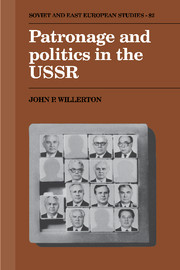Book contents
- Frontmatter
- Contents
- List of tables
- Preface
- Introduction
- 1 The elite, patronage, and Soviet politics
- 2 Networks and coalition building in the Brezhnev period
- 3 Patronage and the Brezhnev policy program
- 4 Patronage, Gorbachev, and the period of reform
- 5 Patronage and regime formation in Lithuania
- 6 Azerbaidzhan and the Aliev network
- 7 The logic of patronage in changing societies
- Appendix
- Notes
- Select bibliography
- Index
- Titles in the series
- Frontmatter
- Contents
- List of tables
- Preface
- Introduction
- 1 The elite, patronage, and Soviet politics
- 2 Networks and coalition building in the Brezhnev period
- 3 Patronage and the Brezhnev policy program
- 4 Patronage, Gorbachev, and the period of reform
- 5 Patronage and regime formation in Lithuania
- 6 Azerbaidzhan and the Aliev network
- 7 The logic of patronage in changing societies
- Appendix
- Notes
- Select bibliography
- Index
- Titles in the series
Summary
Patron–client relations have played an important role in the recruitment, mobility, and behavior of politicians throughout the over seven decades of Soviet power. Operating in a highly centralized institutional setting and guided by a set of norms that reflected the hierarchical nature of political relations, Soviet officials have relied upon clientelistic ties to advance their interests in an essentially insecure political environment. These informal networks of interconnected careers have been critical to the formation of governing coalitions, bridging individual, institutional, sectoral, and regional interests. They have been a major device for increasing and maintaining politicians' power and authority.
However, among the approaches to the study of the Soviet political elite and policy making, patronage has remained an enigmatic and confounding factor. Our limited knowledge about clientelistic norms has stemmed in part from a paucity of information regarding established rules and practices of Soviet elite mobility and regime formation. The lack of extensive biographical and attitudinal data for the national political elite, along with the near absence of systematic data for subnational officials, has obscured the identification of such relationships and their norms. These extra-legal informal political associations are, by their very nature, difficult to identify. The governing ethos of the Soviet Union has decried and denied them. Given these dilemmas, the scholarly work that has been done on patronage, elite mobility, and regime formation has generally been qualitative, time and context-specific, and often speculative. The policy-making implications of these ties and networks have remained essentially unexplored.
- Type
- Chapter
- Information
- Patronage and Politics in the USSR , pp. 1 - 4Publisher: Cambridge University PressPrint publication year: 1991

